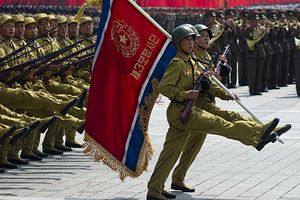Recent rumors of Kim Jong-un’s whereabouts and whether a coup had occurred put our ignorance about what goes on in North Korea on full display. Speculation is natural when it comes to palace intrigue in a post-totalitarian state; of course inquiring minds want to know. But even the most sagacious Korea experts have done little more than speculate. Many find solace in reports of Kim Jong-un’s appearance as confirming the status quo, forgetting that the status quo was rife with uncertainty – the very reason rumors swirled at the first sign of Kim Jong-un’s absence.
Perhaps we can embrace the narrative that the North Korean regime (and many Korea watchers) wants us to believe: Kim Jong-un is firmly in power and his absence, even from key events, is not dispositive of that. But perhaps we should be more skeptical given the vast ocean of what we don’t know, rather than clinging to and extrapolating from the nuggets of what we think we do know.
Given the uncertainty about what is happening or might happen, the prudent policy response is to engage diplomatically with North Korea’s military elements – multiple parts of the KPA and, if possible, the National Defense Commission.
Diplomacy: Not Just for Diplomats
Although diplomacy is typically reserved for diplomats, not warfighters, North Korea’s not a typical state. It’s not just that military spending in North Korea makes up as much as one-third of government expenditures. Nor is it simply the pervasiveness of North Korea’s songun (“military first”) political discourse, or the fact that the KPA is the only network with national reach, resources, and organizational capacity. Perhaps none of this automatically leads one to conclude that diplomatic initiatives toward the brutal KPA is worthwhile.
More compelling is that if a coup ever did take place in North Korea, it would be reasonable to expect the re-ascendance of the military within North Korea’s system of governance, if not an outright military junta. This may be the most dangerous type of power transition for the Korean Peninsula. In such an alternative future, the United States and South Korea would be better served by direct lines of communication to different parts of the military than dealing strictly with Foreign Ministry intermediaries. Minimally, the Alliance would gain additional sources of information from North Korea. Maximally, the Alliance might have a new path for influencing North Korean decision-making – not the most likely outcome but possible, and at minimal cost.
There are also historical reasons to expect that the KPA would be amenable to direct interaction with U.S. and South Korean militaries. In October 2000, when North Korea was invited to send a senior envoy to the White House to meet with President Clinton, Kim Jong-il didn’t send a diplomat, but Jo Myong-rok, a high-ranking general and First Vice Chairman of the National Defense Commission, fully clad in his military uniform. And while North Korea’s nuclear diplomacy has traditionally (and perhaps rightly) been handled by its Foreign Ministry, other meaningful negotiations have been led by the KPA. In 1968, for example, when North Korea captured the USS Pueblo intelligence collection vessel and held its crew hostage, it was the KPA that led year-long negotiations with the U.S. military-led United Nations Command Military Armistice Commission (UNCMAC). In 1976, when North Korea’s killing of U.S. soldiers triggered a crisis and President Gerald Ford and Henry Kissinger threatened retaliation, it was again the KPA which issued a personal apology to the United States on behalf of Kim Il-sung; it was also the KPA which negotiated an end to the crisis, through U.S. counterparts at UNCMAC.
None of this suggests that the United States and South Korea should stop engaging with North Korea’s Foreign Ministry: This must continue. But the United States and South Korea should not be limiting themselves to engaging with a narrow cross-section of North Korea’s diplomatic elite at a time when it remains unclear who is in charge or for how long. North Korea has a track record of engaging the outside world with its military, and there’s value in understanding what military elements are saying – about North Korean interests, who is in charge, and what North Korea will and won’t do—and then comparing that to what North Korean diplomats and others are saying. We can’t afford to stay cutoff from additional potential channels of information when we know so little about what goes on inside North Korea’s borders.
Of course, South Korea’s recent high-level but subdued talks with North Korea on the sidelines of the Asian Games may provide additional channels for insight, making it a smart move on South Korea’s part. But it makes little sense for only a single, high-level political channel to exist for communication when others might be possible. Military engagement channels could benefit not only the United States but South Korea as well.
Military diplomacy isn’t going to be a cure-all; with a challenge like North Korea nothing can be. After all, opening up communication channels with North Korea’s military could increase the difficulty of orchestrating U.S. or alliance policy toward North Korea…but that’s no reason to remain in the dark. Defense needs to be more than a crude instrument of violence when possible; faced with pervasive uncertainty about what goes on in North Korea, it may have the potential to be an instrument aiding diplomacy too.
Dr. Van Jackson is a Visiting Fellow at the Center for a New American Security and Council on Foreign Relations International Affairs Fellow. A longtime North Korea watcher, he previously served as the Senior Country Director for Korea in the Office of the Secretary of Defense. The views expressed are his own. Follow him on Twitter @WonkVJ.

































